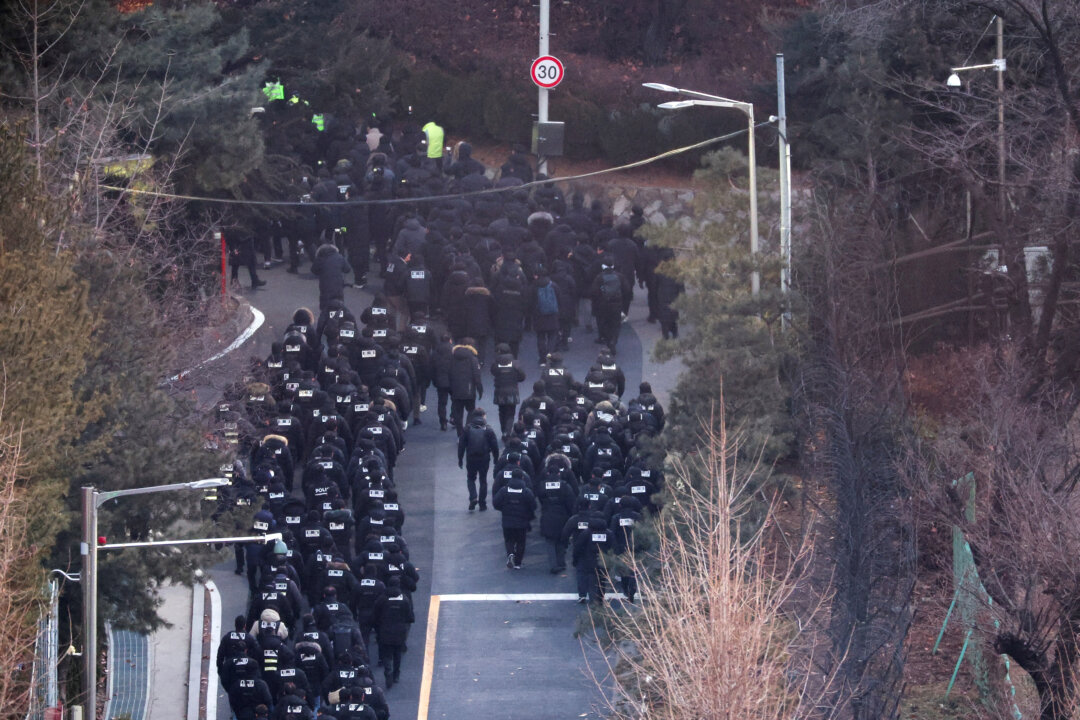President Yoon said he regards the investigation as illegal, and that he allowed himself to be arrested to avoid a violent incident.
South Korean investigators on Jan. 15 arrested President Yoon Suk Yeol—who is currently suspended from office—over his short-lived martial law declaration last month.
Local media reported that a convoy of vehicles was seen departing the presidential residence, and is believed to be transporting Yoon to the Corruption Investigation Office for High-Ranking Officials (CIO) headquarters for questioning.
Authorities said that about 3,000 police officers were deployed to support the execution of the warrant and to secure Yoon’s compound, according to Yonhap News Agency.
The CIO said the process went smoothly and “no physical clashes” occurred when investigators executed the warrant to detain Yoon, unlike the previous attempt when Yoon’s security team barricaded the presidential residence to prevent investigators and police officers from entering.
“Unlike during the first attempt, there were no personnel or Presidential Security Service [PSS] staff actively resisting the execution,” a CIO official told Yonhap.
The arrest was made after the CIO secured a second arrest warrant for Yoon last week. The CIO now has up to 48 hours to hold Yoon, who is facing charges of leading an insurrection.
In a statement posted on Facebook following his detention, Yoon defended his martial law declaration and reiterated that it was intended to protect the country’s “liberal democracy and constitutional order.”
“Martial law is not a crime. Martial law is an exercise of presidential authority to overcome a national crisis,” Yoon stated in a lengthy post accompanied by a photo of his handwritten letter addressed to the public.
In a pre-recorded video message on Jan. 15, Yoon spoke about why he had opted to appear before the CIO.
“To prevent an unfortunate and violent incident, I decided to appear before the CIO even though I believe the investigation is illegal,” he was quoted as saying by Yonhap News Agency.
Yoon, who was previously South Korea’s chief prosecutor, has been suspended from official duties since the opposition-led National Assembly voted to impeach him on Dec. 14.
Yoon’s lawyers have previously filed complaints with public prosecutors against the CIO, claiming the execution of the warrant was illegitimate.
They also filed complaints against the country’s acting national police chief, the acting defense minister, and two Seoul police officials for allegedly ignoring the PSS’s request to provide additional forces to block Yoon’s detention attempt.
Prior to the arrest, investigators had summoned the president three times for questioning, but Yoon failed to comply with all summonses, prompting them to obtain an arrest warrant.
The initial arrest warrant expired on Jan. 6 after attempts to arrest him were thwarted by the PSS. Investigators faced resistance from Yoon’s supporters rallying outside the residence to block his detention.

Police said on Jan. 3 that investigators managed to move past a military unit barricading the residence, only to face further resistance from the PSS, resulting in a five-hour standoff.
Yoon’s presidential powers were suspended on Dec. 14 after the National Assembly, which is dominated by the liberal opposition Democratic Party DP, voted to impeach him.
Yoon, a former public prosecutor, was elected president in 2022 on the conservative People Power Party ticket.
He has presidential immunity from criminal prosecution, but that does not extend to allegations of rebellion or treason.
On Dec. 3, 2024, hundreds of troops and police officers were deployed to the National Assembly, but lawmakers refused to approve Yoon’s martial law decree, forcing him to reverse the decision.
The Constitutional Court is deliberating on whether to formally remove Yoon from office.
Yoon’s surprise declaration of martial law late on Dec. 3, 2024, led to a standoff with lawmakers, who rejected the president’s attempt to impose a ban on political activity and censor independent media and publications.
Yoon has defended his declaration of martial law, saying that it was meant to protect the country’s democracy and serve as a warning to opposition parties, which he accused of sympathizing with North Korea and paralyzing state affairs by impeaching top officials.
Some 280 troops were reportedly deployed following the decree to secure the National Assembly Building in Seoul. Yoon rescinded the decree six hours after the National Assembly unanimously passed a motion to lift it.
Insurrection is one of the few charges for which a South Korean president does not have immunity, and if found guilty, Yoon could face life imprisonment or the death penalty.

